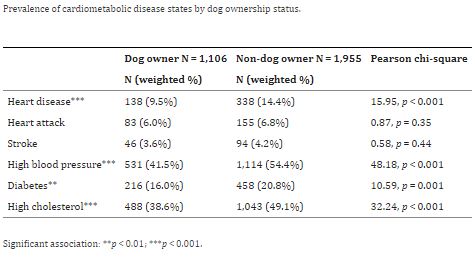PALO ALTO, CA — Owning a dog reduces the rates of a range of cardiovascular and related diseases in veterans, according to a new study.
The report in Scientific Reports pointed out that dog ownership has been associated with reduced cardiovascular and all-cause mortality in civilian epidemiological samples.1
In this study, researchers from the National Center for PTSD, Dissemination and Training Division at the VA Palo Alto, CA, Healthcare System and colleagues examined associations between dog ownership and cardiometabolic disease in the 2019-2020 wave of the National Health and Resilience in Veterans Study.
The study team obtained dog and cat ownership data from 3,078 veterans and cross-tabulated the information with self-reported and professionally diagnosed heart disease, heart attack, stroke, high blood pressure, diabetes and high cholesterol.
Results in unadjusted tests suggested that dog ownership was associated with lower rates of heart disease, high blood pressure, diabetes and high cholesterol, although cat ownership was not.
“Relative to nonowners, dog owners were younger, were more likely to screen positive for posttraumatic stress disorder and/or major depressive disorder and more active,” the researchers reported.
Binary logistic regression models of associations between dog ownership and cardiometabolic disease were adjusted for age, sex, trauma load, mood disorder, substance abuse, nicotine abuse and exercise. “After adjustment, dog ownership was still associated with lower odds of hypertension and high cholesterol,” the authors noted. “Dog ownership also interacted with exercise to lower odds of heart disease and attenuated the effect of trauma load on hypertension.”
They noted, however, that age interacted with dog ownership such that odds of diabetes and stroke were higher in older veterans who owned dogs.
“Dog ownership may be associated with lower odds of hypertension and high cholesterol in U.S. military veterans, and, when combined with exercise, associate with reduced heart disease; however, some of the protective effects appear to be moderated or even reversed by advanced age and nicotine use disorder,” according to the report. “While dog ownership could provide an adjunctive, non-pharmacologic avenue for primary and secondary prevention of PTSD-associated cardiometabolic disease, further research may identify conditions in which it is contraindicated.”
The authors called for a new analysis of cardiac risk profiles among veterans who acquired dogs mitigate the adverse social impacts of the COVID-19 pandemic. That, they said, “may shed more light on the possibility that dog ownership could play a causative role in cardiometabolic disease risk reduction.”
A study last year led by the VA Maine Health Care System in Augusta in conjunction with the University of Alabama in Tuscaloosa found a range of health benefits from owning dogs, but not cats.
“Pet ownership literature remains mixed regarding associations with mental and physical health outcomes among older adults,” researchers wrote in the International Journal of Environmental Research and Public Health. “The present study investigates the relationship between pet ownership and depression, health, and physical activity in an older adult sample balanced by sex (male/female), race (white/Black), and urban/rural status.”2
Study participants were adults 65 and older recruited between 1999 and 2001 in the University of Alabama at Birmingham Study of Aging. Participants completed the Geriatric Depression Scale, a single-item self-reported health measure, and a physical activity questionnaire.
“Dog owners reported better subjective health and were more likely to walk for exercise as compared to non-pet owners,” the authors reported. “Cat owners did not differ from non-pet owners in terms of self-reported health or walking.”
The researchers found that white participants were more likely than Black participants to report ownership of a pet.
No relationships were found between pet ownership and symptoms of depression, and the findings were not influenced by sex, race or geographical location, they added.
“Dog ownership may be associated with positive physical health behaviors and subjective health perceptions,” the study concluded. “Additional research focused on mechanisms and cognitive impact is needed.”
The researchers cautioned, however, “Although there may be physical health benefits of dog ownership, adopting a pet should not be viewed as a simplistic solution to alleviating depression in older adults.”
- Woodward SH, Baldassarri SR, Pietrzak RH. Dog ownership may promote cardiometabolic health in U.S. military veterans. Sci Rep. 2023 Jul 8;13(1):11075. doi: 10.1038/s41598-023-38038-4. PMID: 37422586; PMCID: PMC10329684.
- Albright AE, Cui R, Allen RS. Pet Ownership and Mental and Physical Health in Older White and Black Males and Females. Int J Environ Res Public Health. 2022 May 6;19(9):5655. doi: 10.3390/ijerph19095655. PMID: 35565050; PMCID: PMC9103503.

